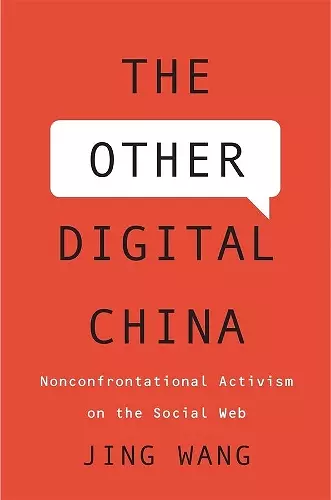The Other Digital China
Nonconfrontational Activism on the Social Web
Format:Hardback
Publisher:Harvard University Press
Published:31st Jan '20
Should be back in stock very soon

A scholar and activist tells the story of change makers operating within the Chinese Communist system, whose ideas of social action necessarily differ from those dominant in Western, liberal societies.
The Chinese government has increased digital censorship under Xi Jinping. Why? Because online activism works; it is perceived as a threat in halls of power. In The Other Digital China, Jing Wang, a scholar at MIT and an activist in China, shatters the view that citizens of nonliberal societies are either brainwashed or complicit, either imprisoned for speaking out or paralyzed by fear. Instead, Wang shows the impact of a less confrontational kind of activism. Whereas Westerners tend to equate action with open criticism and street revolutions, Chinese activists are building an invisible and quiet coalition to bring incremental progress to their society.
Many Chinese change makers practice nonconfrontational activism. They prefer to walk around obstacles rather than break through them, tactfully navigating between what is lawful and what is illegitimate. The Other Digital China describes this massive gray zone where NGOs, digital entrepreneurs, university students, IT companies like Tencent and Sina, and tech communities operate. They study the policy winds in Beijing, devising ways to press their case without antagonizing a regime where taboo terms fluctuate at different moments. What emerges is an ever-expanding networked activism on a grand scale. Under extreme ideological constraints, the majority of Chinese activists opt for neither revolution nor inertia. They share a mentality common in China: rules are meant to be bent, if not resisted.
Drawing on firsthand experience and rich data, The Other Digital China reveals a vast gray zone of nonconfrontational activism for social change. This mundane activism is propelled by social media and practiced by NGOs, entrepreneurs, state actors, programmers, and ordinary citizens. Written in spirited prose, this important book brings provocative new perspectives into the debates on digital politics and society. -- Guobin Yang, University of Pennsylvania
A very important book. Jing Wang’s exploration of how certain kinds of NGOs are using China’s hyperactive media tools to engage in novel forms of social action ‘for good’ is extremely innovative and provides wonderfully rich empirical descriptions of contemporary social life. Everyone who cares about politics and media systems in China should be paying attention to what Wang calls ‘Activism 2.0.’ -- Judith B. Farquhar, University of Chicago
This book offers a unique and timely perspective on social media and civil society in China. The author builds on her own experiences to show how the use of digital technologies has given rise to new forms of civic engagements. Jing Wang provides ample examples of how the post-1980s and post-1990s generations are drawn to the culture of ‘tech4good’ and social media for social good thanks to the affordances of new technologies. -- Marina Svensson, Lund University
Offers a way forward for those in China—and perhaps elsewhere—who want to make progress within a totalitarian state…Truly thought provoking in a way that few books are. -- Kentaro Toyama * China Review International *
[Those] wishing to understand and participate in future social change in China will find this book an invaluable roadmap. -- Jacob Pagano * Critical Inquiry *
A timely documentation of the rapidly changing world of Chinese civic life aided by the social media. -- Dan Chen * Journal of Chinese Political Science *
ISBN: 9780674980921
Dimensions: unknown
Weight: unknown
320 pages